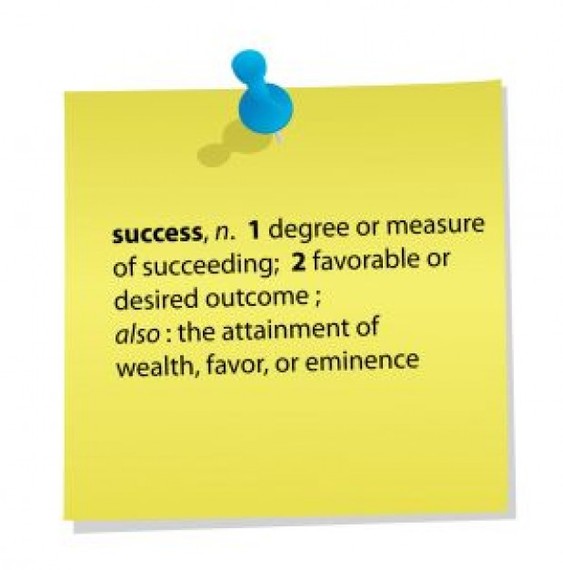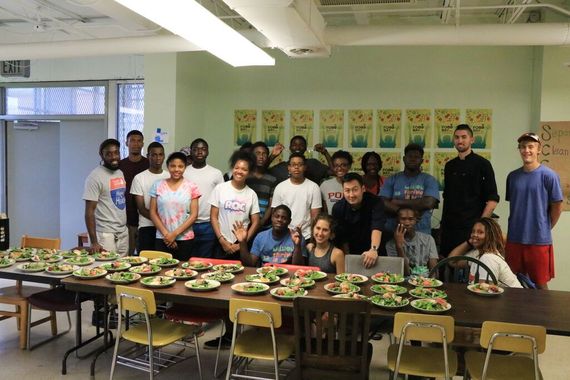It's pretty much a universal rule: Parents want their children have a better life than they did.
One of the best ways to give your child a head start on success is to encourage healthy lifestyle habits. We all know that wellness-focused children often grow up to become healthier, happier, more productive adults, and that often leads to success. Food plays an enormous part, because it can heal or harm, affecting energy levels, mood, ability to focus and more. Let's be clear: You just can't be happy when you're sluggish, irritable, anxious and fuzzy-minded.
"Good health enables one to better manage a stressful, demanding job or career," said Dr. Patti Friedman, PsyD. "For instance, I cannot possibly be an astute, focused and mindful psychologist if I am grappling with poor self care and health issues, such as sleep deprivation, chronic stress, poor nutrition, excess alcohol use, lack of exercise, professional burnout, etc."
HAPPY AND HEALTHY CAN LEAD TO SUCCESS
Not so long ago, it was common thinking that success made people happy, but now it's understood that happiness actually improves the chance of success, says the American Psychological Association. Happy people are more likely to work toward goals, find the resources they need and attract others with their energy and optimism, key building blocks of success.
Not only is a healthy lifestyle one of the best ways to prevent many types of illnesses, including cancer, says the MD Anderson Cancer Center, but it also reduces stress and increases coping skills, resulting in better happiness and a more productive employee, says the Centers for Disease Control and Prevention.
In fact, healthy eating, exercise and quiet time (meditation) are three things successful people do every day, says Forbes Magazine.
It's not just absenteeism that we need to be concerned about, either. In fact, one of the biggest financial drains is exactly the opposite, presenteeism, when someone physically shows up but is "out of it," either because of illness, worry or some other preoccupation. According to the Harvard Business Review, many employers consider it much costlier than its counterpart, absenteeism.
HEALTHY KID=HEALTHY ADULT
According to LetsMove.org, parents and caregivers play a crucial role because they are the ones who set examples for children to make wise choices that last a lifetime. Help your child by:
1. Encouraging a healthy weight. Obesity, overweight and out-of-shape all take a huge physical and emotional toll, which leads to chronic diseases, such as diabetes and fatty liver syndrome. In fact, overweight is one of the three preventable risk factors for premature mortality, according to the Harvard School of Public Health. (The other two preventable risk factors are smoking and high blood pressure.) Don't think your kid is safe from health problems just because of age; obesity puts kids at greater risk for Type 2 diabetes, high cholesterol, metabolic syndrome, as well as other once thought of as "adult-only" diseases, says the CDC.
Persuade them to participate in after-school activities, as opposed to sitting in front of the television or video games. Have your child eat a salad or some cut-up vegetables before they eat dinner. Picky eater? No worries because, with a little creativity, you'll be able to introduce more fruits and vegetables to the diet, rather than potato chips and cookies.
Remember, the mind needs exercise as much as the body, so encourage games, puzzles, conversation and physical activity. Mother-Of-Two and Real Estate Executive Louise Phillips Forbes, who is also very much wellness-focused, recently tweeted and posted on Instagram about her family's "Morning Chess Rounds" with the comment that it's "amazing what happens when there is no screen time 'til sundown!" Here's Louise's family at "Morning Chess Rounds." Chess, as most of us know, is a game of strategy and tactic.
2. Giving them a garden of their own. It doesn't matter if it's a patch of land in the back or front yard, a container garden on a fire escape or even an avocado pit in a glass of water, kids are naturally curious, so they're more likely to eat something they grew. They'll learn to become nurturing, because they'll be taking care of something from start to finish. They'll also gain additional skills, according to Education.com, such as hand-eye coordination, counting and measuring. Most of all, they'll learn that all-important skill, patience; after all, nothing grows overnight and Forbes has reported that leaders who fail to practice patience will find their careers short-lived.
3. Participating in a community wellness program, such as Wellness in the Schools, which encourages healthy eating, environmental awareness and fitness for kids in public; Jackson Healthcare, which especially tackles childhood obesity, or Baltimore City's Mission Thrive, an empowerment program that focuses on healthy eating and lifestyle AND leadership skills. The focus is to build healthy communities.
Mission Thrive is a collaboration between Real Food Farm and Baltimore City's Institute for Integrative Health. Kids become engaged in farming, cooking, fitness activities, nutrition education, and mindfulness training, all skills that help develop leadership. Here they are, proudly displaying their just-cooked healthy meals.
I spoke to the kids who all told me the program is "grueling" and much of that, says Friedman, is because it teaches about process, patience and perseverance -- all skills that can result in success, says US News & World Report. "One of the problems I see in today's world is that everyone is programmed to expect instant gratification," she said, "but these kids are taught the importance of patience. Cooking isn't instant; meditation takes time and patience and yoga is a practice."
HERE'S WHAT THE KIDS THEMSELVES SAY
Accomplishment, keeping an open mind willing to explore new ideas, and a healthy new lifestyle are just some of the things 16-year-old Tariq L. learned. Although he looked at many great programs, it was the sense of community that really drew him in.
In fact, appreciation of that sense of community seemed to be a running theme among all the Mission Thrive kids with whom I spoke.
• "It's true that you do have more energy, focus and strength," Tariq said. "Just the meditation alone has helped me a lot, because now I don't feel so overwhelmed and I'm really able to focus. I don't see that in a lot of people."
• "The community doesn't seem to have much law and order," said 16-year-old Brianna W., who told me she's known since she was 7 that she wants to be a lawyer, "and I want to help change that. The program has taught me about accountability, responsibility, respect, and community."
"When people don't have access to community, when they can't talk things out with others, that's when things go out of perspective and we see overwhelm and things like road rage," says Friedman.
A few simple things will help you give you child a heads up for a happy, healthy and successful life -- and, remember, many of the community programs can be easily replicated in your own area.


